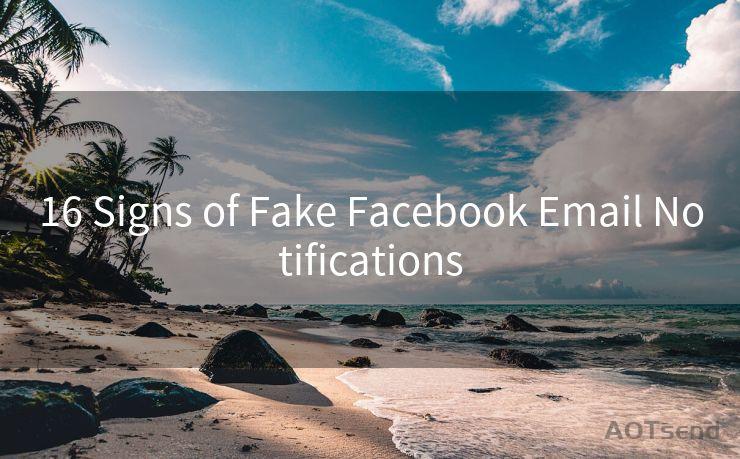16 Signs of Fake Facebook Email Notifications




In the digital age, email has become a primary method of communication, but it also poses risks, especially when it comes to phishing attacks and scams. One common tactic used by scammers is to send fake Facebook email notifications to lure unsuspecting users into divulging sensitive information. To protect yourself, it's crucial to recognize the signs of these fraudulent emails. Here are 16 telltale signs that can help you identify fake Facebook email notifications:
1. Suspicious Sender Address
Always check the sender's email address. Facebook emails typically come from an official @facebook.com domain. If the sender's address looks similar but is slightly off, such as @facebok.com or @facebo0k.com, it's likely a fake.
2. Urgent or Threatening Tone
Fake emails often use language that creates a sense of urgency or fear, pressuring you to act quickly. Phrases like "Your account will be disabled if you don't respond immediately" are common tactics.
3. Grammar and Spelling Errors
Official communications from large companies like Facebook are usually well-written and proofread. If an email contains numerous spelling or grammatical errors, it's a red flag.
4. Unfamiliar Links
Hover over any links in the email before clicking. If the URL doesn't match Facebook's official domain or looks suspicious, avoid clicking it.
5. Requests for Sensitive Information
Facebook will never ask you to send your password, credit card information, or other sensitive data via email. Any such request is a clear sign of a scam.
6. Generic Greeting
Official emails from Facebook will often address you by name. If an email starts with a generic greeting like "Dear User" or "Dear Member," it's probably not genuine.
7. Unusual Formatting or Design
Pay attention to the email's design and formatting. Fake emails may have inconsistent fonts, colors, or layouts compared to official Facebook communications.
8. Unsolicited Attachments
Be cautious of any unsolicited attachments in emails claiming to be from Facebook. These could contain malware or viruses.
9. Lack of Personalization
Official emails from Facebook often contain personalized information, such as your name or account details. If an email is lacking this personalization, it might be fraudulent.
10. Odd Timing
If you receive an email claiming to be from Facebook at an unusual time, like the middle of the night, it could be a scam.
11. Requests to Verify Account Details
Be wary of emails asking you to verify your account details by clicking on a link or replying with sensitive information. Facebook will not ask you to do this via email.
12. Offers That Are Too Good to Be True
Scammers often use enticing offers, like promises of free money or prizes, to lure victims. If an email from "Facebook" promises something that sounds too good to be true, it probably is.
13. Threats to Delete Your Account
Emails threatening to delete your account if you don't take immediate action are typically scams. Facebook will not threaten to delete your account via email without giving you ample opportunity to resolve any issues.
🔔🔔🔔
【AOTsend Email API】:AOTsend is a Managed Email Service for sending transactional emails. Support Email Types: reminders, authentication, confirmations, notifications, verification codes, invoices, password resets, account activations, billing statements, two-factor authentication (2FA), and one-time passwords (OTP) emails, etc. $0.28 per 1000 Emails. 99% Delivery, 98% Inbox Rate.
You might be interested in:
Why did we start the AOTsend project, Brand Story?
What is a Managed Email API, How it Works?
Best 25+ Email Marketing Platforms (Authority,Keywords&Traffic Comparison)
Best 24+ Email Marketing Service (Price, Pros&Cons Comparison)
Email APIs vs SMTP: How they Works, Any Difference?
14. Requests to Forward the Email
Be suspicious of any email that urges you to forward it to your friends or family. This is a common tactic used by scammers to spread their phishing attacks.
15. Missing or Incorrect Contact Information
Check the email for contact information like a customer service number or email address. If this information is missing or incorrect, the email is likely fake.

16. Inconsistent Logo or Branding
Pay attention to the Facebook logo and overall branding in the email. If they look different from the official Facebook logo or if the colors are off, it's a sign of a scam.
By being aware of these 16 signs, you can protect yourself from falling victim to fake Facebook email notifications. Always err on the side of caution when dealing with any email that claims to be from Facebook, and never hesitate to report suspicious emails to Facebook's security team.




Scan the QR code to access on your mobile device.
Copyright notice: This article is published by AotSend. Reproduction requires attribution.
Article Link:https://www.mailwot.com/p4402.html



